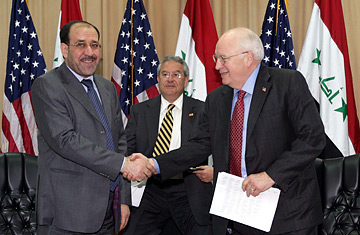
Iraqi Prime Minister Nouri al-Maliki (L) shakes hands with U.S. Vice-President Dick Cheney May 9, 2007.
The real work must be done in Saudi Arabia, where Cheney needs to calm Saudi nerves over Iran. U.S. officials who visit the Gulf tell me that their Saudi interlocutors all ask the same questions: When the United States is forced to cede Iraq to Iran, what happens next? Or, more fatefully, what happens to the Arabs when one day the U.S. reconciles with Iran?
And it's not as if the Iranians have been helping ease Saudi nerves. On Tuesday the Iranian deputy foreign minister offered to give the United States a "face-saving withdrawal." When the Iranians talk like this, the Saudis draw on their worst nightmares, like an Iranian helicopter evacuating the last American troops off the roof of our embassy in Baghdad. The nightmare ends with an isolationist U.S. handing the Gulf over to a "pragmatic" Iran.
It's only a nightmare of course, but Cheney can count on a frigid reception in the hot Saudi desert nonetheless. The signs of deep Saudi anger and panic over how Washington has bungled Iraq have been surfacing for the last two months. In March King Abdallah hosted Iranian President Ahmadinejad, who in normal times is a man whose head Abdallah would prefer to lop off than talk to. Two weeks later, at an Arab summit, King Abdallah called the American presence in Iraq an "illegal occupation," the same description the Iranians use. In April, King Abdallah reportedly cancelled a visit to Washington and a dinner with Bush out of sheer anger over Iraq.
Cheney is going to need all of his vast political skills to convince the Saudis things in Iraq are not as bad as they look. One argument that would serve Cheney well is persuading the Saudis that a Shi'a Iraq is not necessarily the same thing as an Iranian Shi'a Iraq. He should point out that U.S. forces have started working alongside the Mahdi Army of radical Shi'a cleric Moqtada al-Sadr in Baghdad, a sign that the United States has the sense and ability to try to help and stand Sad'r up on his own, and in so doing, help cut the Shi'a umbilical cord to Iran.
But much more crucially, Cheney has to hammer home the message that only the U.S. can stop Iran from getting a nuclear bomb. A meeting of the five permanent U.N. Security Council members on Wednesday in Berlin to discuss a new resolution against Iran should help.
If, on the other hand, Cheney tells the Saudis that our only plan is to stay the course, leave Maliki in place, hold off a rising Republican revolt againt the war, and run out the clock for the last eighteen months of the Bush Administration, he can only expect the Saudis to continue making plans of their own.
Robert Baer, a former CIA field officer assigned to the Middle East and Time.com's intelligence columnist, is the author of See No Evil and, most recently, the novel Blow the House Down
